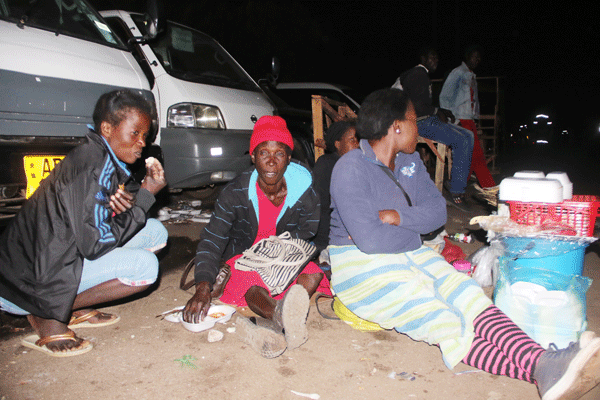
It was a Wednesday night at the Tobacco Sales Floor (TSF) in Harare’s Southerton area.
news in depth BY TAPIWA ZIVIRA

A cold breeze swept through the cluttered makeshift shelters and vending sites constructed along the edges of the road that surrounds TSF, raising dust, much to the dismay of vendors who were selling various wares and foodstuffs.
The place is like one giant improvised marketplace with loud music blaring from both sides of the road.
At one spot, dozens of mostly men — holding bottles of Super Chibuku opaque beer — gathered around two loud speakers that were playing songs from the little-known sungura musician Mark Ngwazi and Njanja Express’s latest album, Gudo Muriwo.
In one corner, two men were preparing French fries on a gas burner while next to them cooler boxes full of beer — opaque and lagers — stood ready for the farmers who would spend the night waiting for their tobacco to go through the auction.
Every kind of vendor one can imagine was there in a bid to benefit from the envisaged good fortunes of the tobacco farmers.
It is a 24-hour business for the vendors who operate both from outside and inside TSF premises.
- Chamisa under fire over US$120K donation
- Mavhunga puts DeMbare into Chibuku quarterfinals
- Pension funds bet on Cabora Bassa oilfields
- Councils defy govt fire tender directive
Keep Reading
“I only go home for two or so hours to change clothes and freshen up. I spend nights here and I sleep right here,” said a vendor pointing to a makeshift mattress.
As the night wears on, and the crowds — mostly farmers — continue to traverse the road that surrounds TSF, it is the beginning of a long nightmare for those who do not have accommodation facilities.
One of them, Jonah Tembo from Karoi, had been in Harare for two days waiting for his tobacco to be auctioned, a situation that left him cashless and destitute.
At around 7pm, he joined hundreds others in the jostle for space in the auction floor toilet, probably the warmest place at night in the area.
“If I do not get into the toilet in time, I will not find space and I will have to sleep outside where it is cold,” he said.
On that particular night, he was lucky because he found a spot to spend the night. After finding some little space in the toilet, he wrapped a little blanket around himself and bid goodnight to this writer.
In defiance of the strong stench in the toilet, hundreds of men seemed to have found peaceful sleep, with some using their bags as pillows.
For Jonah, it was the beginning of yet another night of waiting, first for the auction, then later, for the cash.
Tobacco farmers have been most affected by the cash crisis and last month they staged a demonstration at TSF, demanding their cash, forcing government to review upwards their withdrawal limits to $1 000.
But observations and conversations with several farmers have revealed the cash crisis is still affecting them, with some banks only affording to give out $100 a day.
Outside, some had not been as lucky as Tembo.
With the toilet too small to accommodate the thousands of farmers, some found sanctuary in the car park, pavements and under trees at the auction floors.
With just blankets to warm them, and with the nights becoming colder, they endure long nights on the cold, hard pavements, all in their quest to sell the products of their hard work.
Sellina and her husband had one blanket and they could not look for space in either of the toilets as they had to share the blanket.
“We only have one option, we have to sleep outside as we have to share the same blanket,” she said, resting her head on a concrete slab, with her hand loosely resting on her sleeping husband’s hip.
“When we came here, we thought we would be served within a day or two, but it has been four days now and we were forced to buy a blanket with the little money we had and now we are broke.
“If our tobacco is not sold tomorrow, we will have nothing to eat and drink anymore.”
This writer witnessed hundreds of sleeping farmers scattered all over the TSF premises.
Finding a place to sleep was not the only headache for the farmers. Many of them had travelled to the auction floors without knowing they would end up spending days waiting for the auction and the cash.
“I came here with only $10 in my pocket, and I hoped the money would be enough to just buy me some lunch before my crop is auctioned,” said another farmer who refused to be identified.
Stranded and desperate, the farmers end up falling into the arms of the unscrupulous conmen and sex workers who work in cahoots.
“What happens is that a sex worker approaches a desperate farmer and promises to take care of him until he gets his money then he can pay back, and they will agree, say for $20 a day,” said a vendor.
“All goes well and the farmer gets everything he wants, from food to sex and toiletries. But things get bad when he gets his money and is about to pay back.
“Three or so men, working in cahoots with the sex worker, will approach the couple and claim the sex worker is wife to one of them.
“They will then demand ‘compensation’ from the farmer, who will be forced to part ways with more than he was supposed to pay to get his freedom,” said the vendor.
However, it is not all doom at the auction floors this year as some farmers can afford to be extravagant and spend before they leave TSF.
“With the $100 I got from the bank today, I can afford to enjoy myself before I leave for Karoi tomorrow. Fodya inorwadza [tobacco is not easy to produce] so I must reward myself,” said one farmer who identified himself as Calvin.
With his right arm resting on the shoulders of a skimpily dressed woman and the left clutching a brown lager beer quart, Calvin boasted that he had several thousands of dollars in his account, and spending $100 on his girl would not be a problem.
“I want to have a bit of some good time with this woman. I deserve it after spending seven days waiting here,” he said.
For years, controversy has followed small-scale tobacco farmers each time they travel to Harare to sell their tobacco.
There have been reports of sex workers robbing farmers, or conmen pouncing on the unsuspecting farmers who often spend time far from the hustle and bustle of the city.
If the situation at TSF can be used for all the auction floors, then the story is the same.
This writer witnessed a long queue of sex workers and an equally huge crowd of farmers jostling to negotiate for sex, and the sex workers interviewed said this year has been difficult for them because of the cash crisis.
Far from the extravagance and sex, the cash crisis and the general economic decline appears to have shaken Zanu PF’s stranglehold in the farming communities as many farmers who spoke to The Standard revealed they had lost faith in the party’s ability to deliver.
“I used to be a strong supporter of Zanu PF because the party gave us land, but being made to wait for seven days to get just $100 shows they have failed,” said one farmer.
It is a dilemma for many of the farmers as they fear losing their land once they turn their backs on Zanu PF.
Apart from the cash crisis, some farmers who also grow maize in addition to tobacco expressed anger at how the command agriculture programme was handled.
“In Karoi, they only gave command agriculture support to some top chefs (named) but some even sold the inputs while others did not utilise all the land they have,” said a disgruntled farmer.
“With such corruption at a high level, everything affects us at the end.”
Despite reports of huge sales being reaped from the floors, the poverty and frustration of those who do the donkeywork in the fields — the farmers — is glaring.










